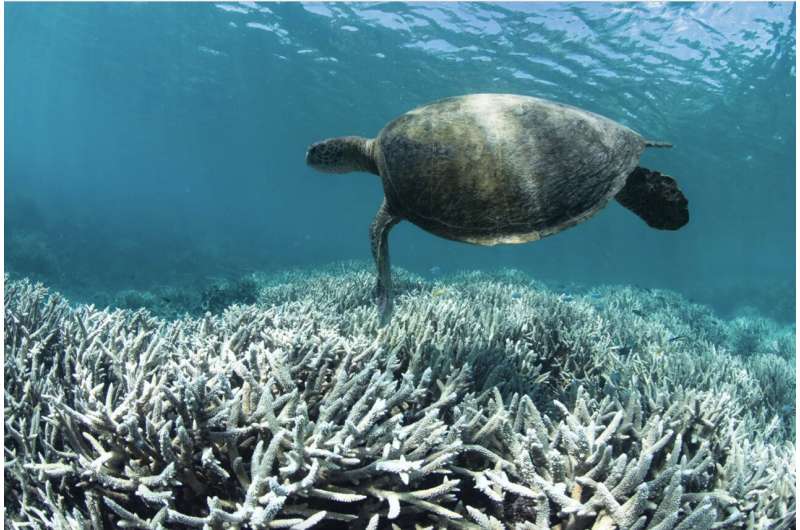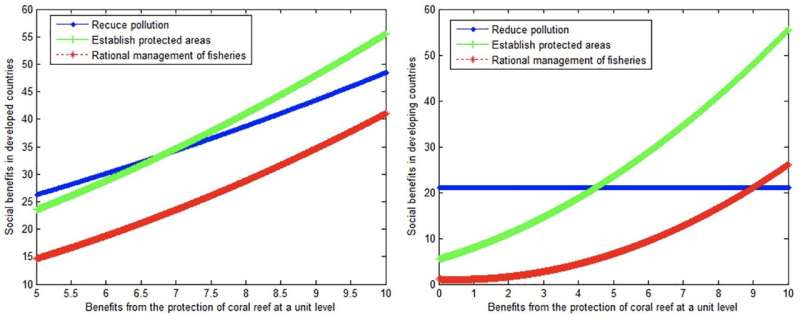April 8, 2024 feature
This article has been reviewed according to Science X's editorial process and policies. Editors have highlighted the following attributes while ensuring the content's credibility:
fact-checked
peer-reviewed publication
trusted source
proofread
Carbon trading solutions for declining coral reef management tested with game theory

Climate change in the media is often represented through evocative images of polar bears on small floating ice rafts and bleached corals—stark white skeletons in the wasteland of a once-thriving marine community. Besides being diverse ecosystems, coral reefs have a vital role in dissipating wave energy to protect coastlines from erosion and natural disasters, as well as being important sources of tourism income for the local economy. Amidst ongoing research into coral reef degradation, scientists are investigating innovative strategies to incentivize change.
A collaborative research team from numerous Chinese universities, led by Yuntao Bai of Shandong Management University, has focused on carbon trading to determine how this can help in reducing pollution, establishing protected areas and managing fisheries. Carbon trading references the sale of credits that allow companies to emit a certain amount of carbon dioxide and other greenhouse gases in order to limit overall emissions.
The new study, published in Frontiers in Marine Science, generated three models to assess the effectiveness of using carbon trading to incentivize action by governments, through to local communities. The first considered marine pollution, referencing plastic pollution, plus sewage and wastewater discharge from cities and agriculture.
One consequence of leaching pesticides and fertilizers from agricultural land to the oceans is eutrophication, whereby nutrient enrichment encourages algal blooms to grow on the surface, ultimately leading to acidic and anoxic conditions in the layers below that become toxic for other marine life, such as fish.
The second model investigated establishing protected areas to instill better practices for tourism, whereby activities are managed to not dive near or walk on coral, and encouraging tourists to use sunscreens that do not contain toxic chemicals when swimming in the area. It can also restrict fishing in these areas through the use of quotas to prevent overfishing and illegal fishing violations, as well as the use of destructive techniques to catch them. This links to the third model of sustainability in the fishing industry.
Yuntao Bai and colleagues also tested the models between developed and developing countries as they have different attitudes towards coral reef management due to available resources and funding. While developed countries may have greater technological advancements and more institutions to conduct research, developing countries may have a more local vested interest in the economic and sustainable food supply consequences of reef management techniques. As such, there needs to be greater international cooperation and shared responsibility to have the most effective impact.

Using differential game theory, whereby the "players" strategies and behaviors develop over time according to specific equations, the researchers aimed to predict the evolution of change with implementation of the three model measures. They found that applying strategies to reduce marine pollution was the most effective solution for small-scale coral reef management, but in order to conserve larger areas, the establishment of marine nature reserves was paramount, while fisheries management was of slightly lesser significance.
The difference between developing and developed countries was considerable. While the benefits of establishing protected areas were slightly higher than reducing pollution for developed countries, for developing regions of the world, normal lower pollution rates meant the most benefit to reefs came from creating bigger nature reserves. At the local scale in developing countries, restrictions on fishing could demotivate cooperation due to the direct economic strain on livelihoods.
However, overall, the ability of countries to "earn" carbon credits due to the sequestration capacity of protected reefs may be a primary incentive to encourage developed regions to invest more heavily in effective management strategies and support developing countries to do so too by sharing resources, thus expanding the blue carbon market (carbon stored in marine ecosystems).
Protecting coral reefs is not only important to restore diversity to marine ecosystems, but they themselves have a key role in combating climate change by being carbon stores. Algae and seagrasses can draw down carbon dioxide from the atmosphere through photosynthesis, while decomposition and burial of organic matter on the sea floor upon death can be a more permanent carbon sequestration solution.
It seems carbon trading could be one way of tipping the balance in the right direction to create a positive impact spiral that alleviates at least some of the pressures of climate change.
More information: Yuntao Bai et al, Reduce pollution, establish protected areas, manage fisheries properly? How to protect coral reefs based on carbon trading, Frontiers in Marine Science (2024). DOI: 10.3389/fmars.2024.1331045
Journal information: Frontiers in Marine Science
© 2024 Science X Network





















